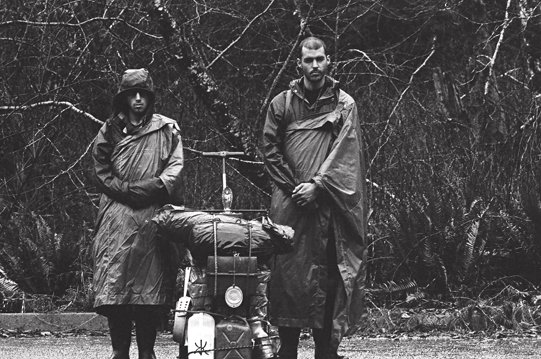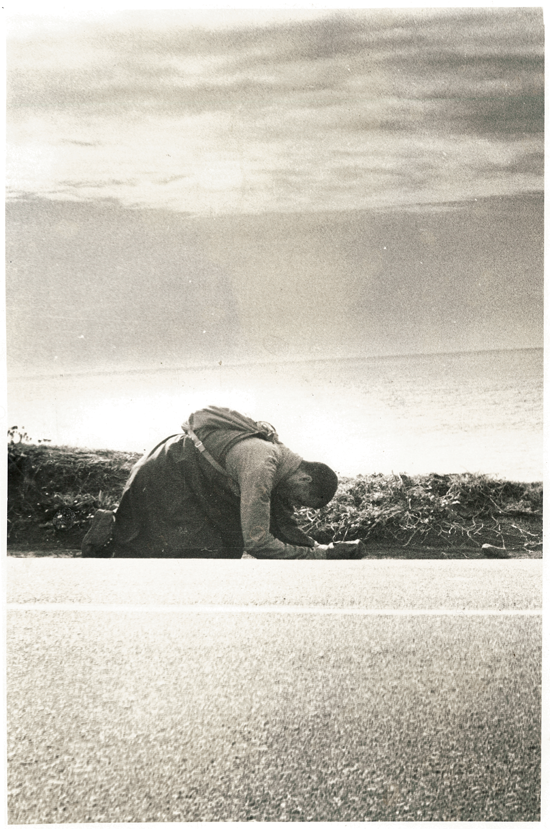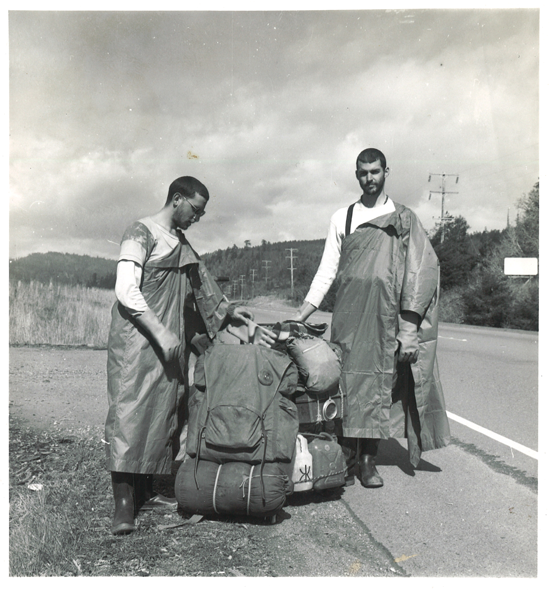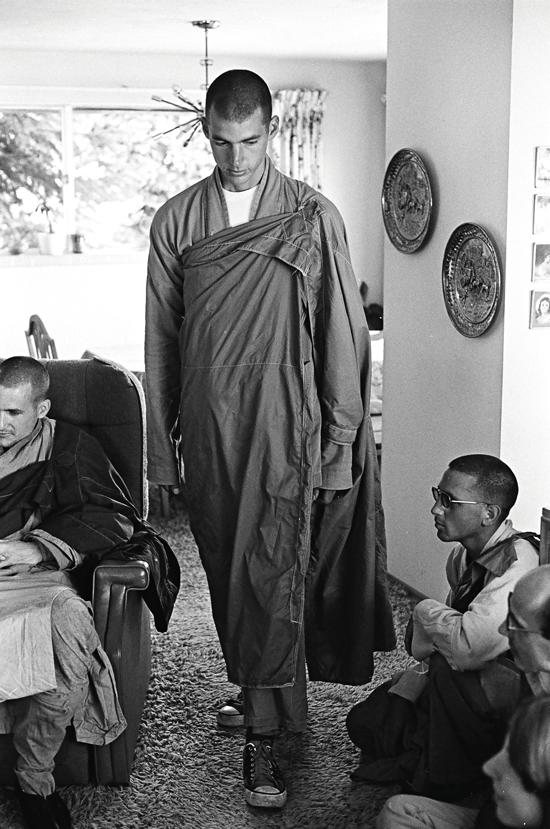I knew my dad had been writing a lot. He would wake up early every morning, make a hot breakfast, walk the dog, meditate for an hour, write for an hour. Then he would wake me up and report his activities, suggesting that I too should get up and do something vigorous, worthy, contemplative. He would also have a hot breakfast waiting for me. That’s the kind of father he was—he showed his love rather than talked about it.
After he died in 1998, while I was cleaning out his study I found a life insurance policy I never knew he had taken out hidden in his desk drawer. Lying next to it was a floppy disk. Written in big block letters across the disk, inked in Sharpie marker, were the words: “JETTI PLEASE PUBLISH OR GIVE TO THE BUDDHISTS. THIS IS MY LAST AND FINAL WISH.” The disk contained an account of his entire life, spanning over 100 pages, documenting everything from his time as a submariner in the United States Navy to his “hippie days” on an anarchist commune.
I was grateful to have a record of his adventures. I knew that his friends and the rest of the family would be interested in reading it, too. But I was surprised and horrified to see that he expected me to publish the damn thing. (Of all the moral teachings my father learned in his study of Chinese Buddhism, I think filial piety was his favorite.)
I was 18 years old, heartbroken over his death, and didn’t exactly have a lot of contacts in the publishing world. With a mixed feeling of dread and duty, I moved the disk, his notebooks, and the computer itself dozens of times with me, from student housing in Arizona to a houseboat in Seattle; from Bellingham, Edmonds, Poulsbo, and Port Townsend, and then back to Seattle again, always keeping it in the small secret drawer of the dresser he had built me.
Somewhere along the way, the disk got lost. I was relieved of the burden, but sad that I had let him down. I knew his was an unfair request to make from the grave, something I would never impose on my own child. Still, I wanted to make him happy. Also, I was pretty sure his ghost would know I had failed at my task and would come to scold me in my dreams. With the disk left unpublished, our karma was left unresolved. My dad believed in reincarnation. What if he came back as my cat or—my God—my child? He had such a powerful presence. Anything was possible.
I had been raised in the Chan tradition, but as time went by I fell away from the Buddhist community, stopped honoring the five precepts, got a job, got married, had a baby. Then last year I was invited to the Buddha’s birthday celebration at a monastery in Washington where I knew a lot of my dad’s old dharma friends would be. Sure enough, I saw Dharma Master Heng Lai, the abbot of Snow Mountain Monastery, who had known him in the ’70s. He said he had a copy of my Dad’s manuscript in a zip file and could email it to me if I wanted. He sent it to me the next day. It was time to take action on my father’s last and final wish.

My dad was an American monk named Heng Ju (Tim Testu), a disciple of Venerable Master Hsuan Hua, whom he referred to simply as “the Master.” Hsuan Hua had come from Hong Kong to California in 1962, after having previously directed followers to establish the Dharma Realm Buddhist Association, from which many affiliated monasteries and centers would spring, including the City of Ten Thousand Buddhas, one of the first Chan temples in the United States and one of the largest Buddhist compounds in the Western hemisphere, where my dad lived on and off throughout his life. (The “city” sits on almost 500 acres of land, which happen to be the former grounds of the county’s 19th-century insane asylum.) The monastery is known for its insistence on strict adherence to the traditional monastic code; the keeping of the five precepts was strongly encouraged, and participating in ascetic practices like eating one meal a day and sleeping while sitting up were commended. In 1973, my dad and another monk, Heng Yo, began a ten-month bowing pilgrimage for world peace through California, Oregon, and Washington, traveling over a thousand miles on foot. It was the first “three steps, one bow” pilgrimage in the history of American Buddhism.
Dad finished his autobiography shortly before he died. It gives the perspective of an older (and maybe wiser) man with a complicated life: two ex-wives, a teenage daughter, alcoholism, and a cancer diagnosis. The last chapter, “After the Monastery,” addresses what happened after he left the structure of the City of Ten Thousand Buddhas and crashed into the world.
Before seeing Heng Lai, I never knew why Dad had left the monastery. I did know how fervently he loved his life as a monk and how he respected and adored his teacher. The family mythology was that he had sneaked out in the middle of the night, crawling on the dried-up riverbed instead of walking out through the main gate. I thought this was a little dramatic, but then, all of his stories about the monastery were dramatic.
The reason he left had something to do with shame. He had gone out drinking as a monk, breaking a basic precept. This was after being ordained for almost a decade, after completing his bowing pilgrimage, after hundreds of newspaper articles had been written about the trip and he had written his own book about it, and after touring Asia with the Master, giving dharma talks to the sangha. The fall from grace was too difficult for him to face.
I know about shame. Dad had lived with a cancer diagnosis from the time I was 11. He used every available minute to “transmit the dharma” to me, lecturing on everything from vegetarianism and respectable conduct to small engine repair, how to vote (Democratic), how to hold your breath underwater, how to drive a stick shift, how to chop vegetables (according to their nature), how to identify good music, how to identify poisonous mushrooms, and most important, how to avoid ego and suffering through cultivating the Way. I wanted to curl my hair, wear cute outfits, and hang out with my friends; I was embarrassed at his devotion to Buddhism and tired of the constant smell of incense. By the time I graduated high school, my understanding of the religion revolved around all of the “no’s” I associated with it: in summary, don’t be yourself. And in addition—be perfect.
At the end of his life, Dad asked me to come home from college to take care of him, and I did. But we had a fight over my frivolous spending, and I moved out. The night he went to the hospital for the last time, we were supposed to have met, to go out to dinner and make up. I know how shame feels. I know regret.
This article is a dream come true for two people. This article is a life fulfilled.
-Jeanette (Jetti) Testu

After the Monastery, by Bhikshu Heng Ju (Tim Testu)
No one could have been more confused than I when I ran out the gate of the City of Ten Thousand Buddhas. The demons of my latent alcoholism, who would guide me right back into the binge drinking patterns from my sailor days, lay waiting to bring me to hell. I didn’t know I was an alcoholic at the time; all I knew was that I wanted to obliterate my unbearable anguish, so I reached out for what was most familiar to me: booze. I drank to kill the pain, and the alcohol created even more pain and remorse.
Driving an old Toyota I’d bought from a faithful layman, I was nailed with a drunk driving ticket before even getting out of California. Once back in the Northwest, it was not long before I’d lost everything of value. My career as a monk vanished, my dharma friends were gone, and I was alone in the world. Alcohol muddled my brain, and in the darkness, seeds of desire sprouted like weeds. I frequented bars, chased women, started smoking again, and drank to forget it all.
I found work as an assistant engineer on a wreck of a freezer ship, the motor vessel Polar Bear, for a long summer of salmon tending. No one knew that I was an ex-monk in hiding. The owner, seeing that I didn’t have enough to do while the ship was at anchor, yanked me out of the engine room and put me to work on the assembly line. Ankle-deep in fish roe and salmon guts, I had plenty of time to contemplate the nature of my fall.
After the first two months swinging on the hook, I couldn’t stand it any longer. I borrowed a motorboat and went upriver until I found the only bar in the area, the Red Dog Saloon, where I promptly went in and got curb-crawling, shitfaced, snot-flying drunk. The next morning I found myself out in the scrub, flat on my back, staring up at a cloudy, menacing sky. After a while, it all came back to me: a couple of fishermen had bushwhacked me outside the bar and beaten me to a bloody pulp.
After the ship returned to Seattle, my downhill slide continued. There were many more pathetic incidents. Carrying a burden of unbearable guilt and shame, I kept trying to straighten out but seemed powerless to do so. What I needed more than anything was to talk to someone about my problems.
On one occasion I wrote a letter to the Master asking for his advice on how to stop drinking. The Master had brought to America the whole range of Great Vehicle Buddhism: the teachings, the secret doctrines, the Pure Land school, the moral precepts, and Chan. I saw in him a living example of the much-sought-after qualities not only of Buddhism but of Taoism and Confucianism as well. He was the first person in my life who totally understood me and really cared about my spiritual welfare—and who was able to do something about it to the ultimate degree.
His manner of speaking was always very penetrating, cutting through the crap and getting down to the problems that we constantly seemed to create for ourselves. “I’m not scolding you, I’m scolding your ghosts,” he once said. But most of his time with us was spent carefully explaining the ailments of the grasping, calculating mind and showing us how to cure ourselves.
“Why don’t you sew your lips shut and try pouring the booze through your nose!” came his written reply.

Back to sea I went. Unable to find fresh vegetables on the ships, I started eating meat. My precepts, both as a monk and a layperson, were history.
In 1970, before I became a monk, I was living at the Buddhist Lecture Hall in Chinatown, San Francisco. Most of us had found living in a temple conducive to keeping precepts, but it was more difficult to keep precepts on the outside, especially for those of us with heavy habit-energy. People would come to the temple, cultivate for a little while, and build up their energy, but when they went back out into the world, they would usually blow it, as I had done.
It was actually at the lecture hall that it first became obvious to me that the Master had access to all of our petty thoughts, past, present, and future. He rarely left his little room in the back of the temple, yet he always knew what was going on, and it always came out. I remember an incident that really shook all of us up. There was a young fellow who had been living at the lecture hall for several months. He had taken the five precepts, the fifth of which prohibits intoxicants, including tobacco. But one night he couldn’t stand it any longer, and he sneaked out on the town. He climbed down the fire escape and was gone for about three or four hours. He returned while everyone was still asleep and was absolutely sure that no one had seen him. But later that morning, while we were all up meditating, the Master approached him, and the following exchange took place.
The Master: “Where did you go last night?”Disciple: “Wh, wh, what?”The Master: “Where did you go last night?”Disciple: “Ahh, ahh, I, I, I, I just went for a little walk.”The Master: “Oh? Well then, who gave you the cigarettes?”Disciple: “Ahh, ahh, I got them at a gas station. I just wanted to walk around and have a smoke.”The Master: “Just walking and smoking, eh? Well then, how come you got on the bus?”Disciple (trembling with fear): “I, I, I wanted to go to Golden Gate Park, and it was too far to walk.”The Master (with ear-piercing volume): “What about that woman on the bus? Why did you offer her a cigarette?”Disciple (by this time blubbering and whimpering): “I didn’t do nothing, I got off the bus after that. Who told you, anyway?”The Master: “Nobody.”Disciple: “Well then, how did you know?”The Master: “Did you know?”Disciple: “Yes.”The Master: “Then you told me!”
At this point, the Master smiled, playfully bonked the kid over the head three times, and returned to his room. Everyone who witnessed this was sweating profusely.

When no sympathy from the Master came, I tried to settle down in Seattle. I even married and became a father, but I wasn’t ready for any of it. I found a job in a local diesel/generator shop, and every night after work I’d go out for drinks with the boys. One morning my wife asked me where I’d left the car.
“Outside, where I always park it,” I replied.
“I suggest you look out the window,” she said. I looked, but the car was not there. I hopped on a bus and spent the rest of the day riding up and down the streets of Seattle until I finally found the car. A bum was sleeping in the front seat, and the back was filled with over one hundred loaves of bread.
When I returned to the house, my wife, who used to work in a detox facility, looked me in the eyes and uttered the sentence that I will never forget: “Tim, you are an alcoholic!” Her truth hurt, yet I knew she was right the instant she spoke. But since alcoholism is a disease characterized by denial, I had to keep drinking just to make sure she was right.
Eventually, inevitably, my wife and I separated, and there was no one left to interfere with my drinking. I got a job on a National Oceanic and Atmospheric Administration (NOAA) ship, and with a loan from the Veteran’s Administration bought a house in the suburbs of Seattle. I didn’t have enough self-esteem to live in it, however, so I took in a Cambodian refugee family while I camped in a 17-foot trailer in the backyard. It was there that I drank myself down to the murky bottom.
“Why don’t you sew your lips shut and try pouring the booze through your nose!”
One morning, waking up to face all the usual horrors of what had become three-day hangovers, I experienced an unusual awakening. Why was I doing this? Why was I drinking myself into oblivion when there was absolutely no reason for it? I had a good job, a wonderful child, a cute house, and no wife to blame. I was free to do whatever I wanted. The drinking just didn’t make sense. At that moment I was able to find genuine resolve. From the bottom of my heart I said to myself, “I don’t care what it takes, I’m going to quit drinking, get sober, and stay sober!” I called the captain of my ship and asked him if he could arrange to send me to an inpatient alcoholism treatment center. He obliged.
I consider the day I got sober as a true awakening and a major turning point in my life. While I was at the monastery, I had followed the rules because I had to, but I couldn’t be sure if I was really doing it or just going along with external pressure. Now I would have a chance, completely on my own, to start over and internalize the rules, to take personal responsibility for my sobriety and spiritual recovery. That solid little thought, mustered up from the depths of my miserable, drunken soul, was the beginning of a new life.
After accumulating a reasonable amount of sobriety, a year or so, I decided it was time to return to the monastery and make amends. I took the thousand-mile trip to Ukiah, California, to the City of Ten Thousand Buddhas, and to the Master.
Prior to the evening dharma talk I lit incense, circumambulated the Buddha and bowed three times, kneeled, and made my formal repentance. The Master observed from the high seat; about a hundred disciples were also in attendance. Following my repentance, the Master said: “Kuo Yu, like most people, you are a mixture of good and bad. Fortunately, you have more good than bad. Just work on making the good points more, the bad points less. Everyone makes mistakes, so don’t worry; everything is OK. Patience is the thing you need to work on now—extreme patience. I know you want to leave the home life again, but you have karma to work out. Stay there for now. Don’t doubt Buddhism, and don’t go to spoil. You have been a very positive influence for Buddhism in the West. You are welcome to come here and cultivate anytime.”
Never, ever, have I felt the weight of such a burden lifted from my shoulders. I was forgiven. I was a free man. I felt like I could fly!

That was then; this is now.
The Master, I’m sorry to say, is dead and gone. His final words: “I came from empty space, and to empty space I return.” Before he passed away, I felt the need to see him one more time, so I made the arrangements, drove to California, and finagled my way in. He was on his deathbed.
I guess I was vaguely hoping that he would transmit the dharma to me or something. But no, I told myself, that didn’t matter. I just wanted to thank him for all he’d done for me and ask his forgiveness for being such a pain in the butt. I also had a question about pure eating. Following my teenage daughter Jetti’s example, I had gone back to my strict vegetarian diet. I’d been doing fine with it for over a year, but I had a big question that was eating away at me. I live in a waterfront cabin on a saltwater bay, and the shoreline is filled with succulent, world-class oysters. It’s great to shuck them right on the beach, leave the shells to spawn, then soak the little buggers overnight in olive oil and herbs and broil them the next day to golden brown on both sides. What a delicacy! So my question was: Since oysters have no arms or legs, no eyes or face, and they grow on rocks, then they must not be an animal. Weren’t they more or less a vegetable? And if so, what harm would it be if I ate them, especially since they conveniently spawned right in my own front yard?
This was the big life-and-death question on my mind, one I had discussed with no one.
When I entered the Master’s room, his attendant announced, “Kuo Yu is here.”
The Master responded, “Kuo Yu, don’t become a fish!”
There is a stage of spiritual development along the bodhisattva path that is called avaivartika, Sanskrit for “irreversible.” At this stage, one’s thoughts, position, and practice no longer turn back toward confusion. When I was the cook at the monastery in the ’70s, I had just taken up the practice of eating only one meal a day, which is really difficult when you’re working with food all the time. I was doing really well for several days, but one morning I couldn’t stand it any longer and decided to have some breakfast. I remember it clearly: I was heading for the icebox. In fact, I had my hand on the icebox door when I looked out in the hallway to see the Master walking by. He was smiling as he walked down the hall. Then suddenly he stopped and began walking backward, retracing his steps back down the hall, around the corner, and out of sight. Not a word was spoken, but I got the message.
Well, once again I hadn’t even asked my question and I received a response. It was also a pun on my name, because yu means “to constantly go beyond” (or overdo things), and another character, yu, means “fish.” If I ate oysters, therefore, I might be reborn as a sea creature, a realm where only one in ten thousand doesn’t die a violent death.
Then the Master kidded me about a letter I’d written a while back, suggesting that there were too many ceremonies at the City of Ten Thousand Buddhas.
“There are many, many dharma doors,” he said. “Not just one. It’s good for people to study many doors.”
“Okay, Shifu [Teacher]. I agree.”
“How old is your daughter?” Shifu asked.
“She’s 14, Shifu. She’s going to a private boarding school, and, well, she’s doing just great,” I rambled on.
“I know,” replied the Master. “Who is going to take care of you when you’re old?” he asked.
“I don’t know, Shifu.” I could feel tears welling up. “All I know is that I just want to cultivate the Way, Shifu.”
“Did you read the latest Vajra Bodhi Sea [the monthly magazine of the Dharma Realm Buddhist Association]?” the Master asked. “The story about the camphor tree?”
“No, Shifu.”
“Get him a copy of the article,” he instructed his attendant. When the attendant brought me the magazine, I sat and read about a camphor tree on Potola Mountain in China that had taken refuge with the Master. The story ended with these words of exhortation: “Whoever you are, if you have a true and sincere mind, if you are not careless in the least, if you do not go along with what worldly people do, but do the contrary, then you will be able to attain the benefit of Buddhism. Whether you are a left-home or layperson, you should be true Buddhists. Don’t be like ordinary people: greedy, fighting, seeking, selfish, and self-benefiting, not letting a moment go by from morning to night without acting falsely. This is most important! These six great principles are the first step toward learning Buddhism and eventually accomplishing Buddhahood. Don’t forget them! Don’t neglect them! We should learn to take more losses and not take any advantages.”
I bowed to the Master.
He smiled and said, “Okay, time for a rest.”
♦
With excerpts from Three Steps, One Bow, by Bhikshu Heng Ju and Bhikshu Heng Yo, 1977. Reprinted with permission of the Buddhist Text Translation Society. Vajra Bodhi Sea, 1995. Reprinted with permission of Gold Mountain Sagely Monastery.
You can now read Bhikshu Heng Ju’s (Tim Testu) personal account of his incredible journey in the book Touching Ground: Devotion and Demons Along the Path to Enlightenment (Wisdom Publications, November 2018), which makes his complete memoir available for the first time.